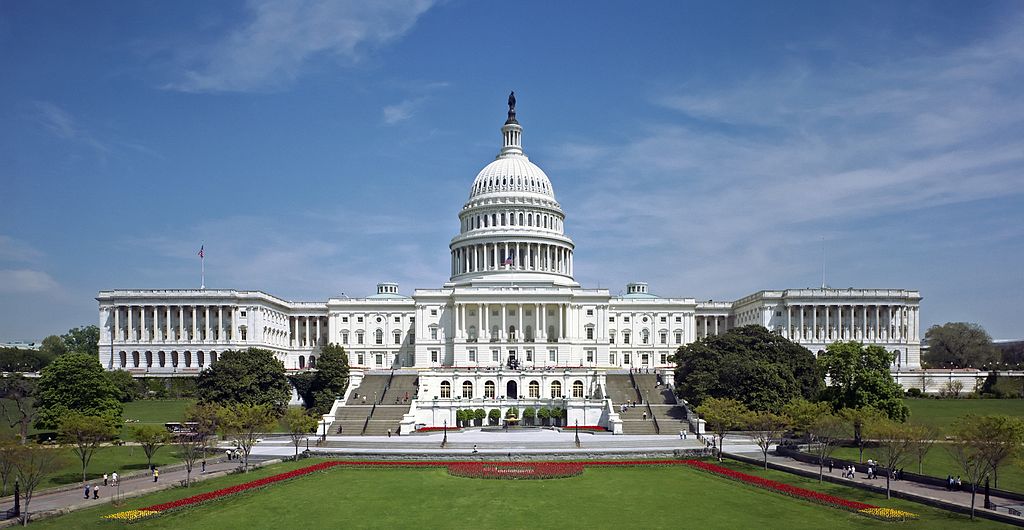Confidence in Government on National Security Matters: July 2018
A year ago, we began a polling project to measure public confidence in government institutions on national security matters on an ongoing basis. This post provides our data for the month of July 2018.

A year ago, we began a polling project to measure public confidence in government institutions on national security matters on an ongoing basis. This post provides our data for the month of July 2018. It includes perceptions about government institutions and about the two major political parties’ handling of national security; about the public’s comfort with intelligence authorities; about the president’s handling of key national security issues; about Special Counsel Robert Mueller’s investigation; and about ongoing military operations.
Confidence in Institutions to Protect U.S. National Security Remains Stable
In the last week of July, we used Google Surveys to ask respondents the following questions about confidence in institutions:
- How much confidence do you have in the Congress to protect U.S. national security?
- How much confidence do you have in the federal courts to protect U.S. national security?
- How much confidence do you have in the president to protect U.S. national security?
- How much confidence do you have in the intelligence community to protect U.S. national security?
- How much confidence do you have in the military to protect U.S. national security?
In July, public confidence in the president on national security matters dropped. This stands in stark contrast to every other institution, about which confidence increased since our previous month’s polling in late June. On a scale of 1 (“No confidence”) to 5 (“High confidence”), the average score for each institution from highest to lowest score was: 3.94 for the military, 3.22 for the intelligence community, 2.93 for federal courts, 2.75 for the president and 2.54 for Congress.
Confidence in President Trump on national security fell to 2.75 in July from 2.83 after his June summit with North Korean leader Kim Jong-un. This drop in public opinion may reflect criticism the president received from across the entire political spectrum for his performance at his summit in Helsinki with Russian President Vladimir Putin and the conflict with NATO allies that preceded his meeting with Putin. Confidence in the president dropped by a comparable amount among men and women, but among people under 35 years old, it dropped from 2.68 to 2.55 while there was no change with people over 55. This runs contrary to the idea that older Americans, who experienced the Cold War firsthand, would be more critical of the president’s obsequiousness toward Putin. Note that the presidential confidence average is still considerably above its low point in our polling—it has been generally on the rise over the past year. The July dip largely wiped away the previous month’s gain.
Diminished confidence in the president, however, is noteworthy because public confidence increased in every other institution in July. In June, confidence in the president and the federal courts stood even at 2.83. But in July, confidence in the courts increased to 2.93 while confidence in the president dropped to 2.75. Additionally, the share of respondents who gave the intelligence community the highest level of confidence—a 5 on our scale—increased from 15 percent in June to 22 percent in July. The Deep State had a good month.
Are Democrats Closing the Security Gap?
We ask two separate questions to gauge the public’s party preferences on national security. And the results are not wholly consistent.
One is on confidence in the parties to handle national security matters generically. On that question, in July, average confidence in the Republican Party’s ability to protect U.S. national security stood at 2.68, and average confidence in the Democratic Party’s ability stood at 2.61. Both parties are perceived more favorably than is Congress as a whole, which has an average confidence score of 2.54.
This marks the second straight month that confidence in the Republican Party dropped and confidence in the Democratic Party increased. While the Republican Party continues to garner more confidence than the Democratic Party when it comes to national security, the gap between the two parties is narrower than it has been at any time since last October.
We pay particular attention to this statistic and a similar tracking question asked by Gallup every September. In Third Way research, we have seen that when the gap is narrower Democrats tend to fare better in elections, as this security gap is often a leading indicator of overall party favorability.
If the results of the first question look promising for Democrats, the results of our second question—Which of the parties will do a better job protecting the country from international terrorism and military threats?—should encourage Republicans. On that question, the Republican advantage increases when respondents are asked to choose between the parties or options of “neither” or “don’t know.” When asked in this manner, 31 percent of respondents chose the Republican Party, while only 24 percent chose the Democratic Party; 24 percent chose “don’t know,” and 21 percent chose “neither.”
This seven-point gap between the parties in July is smaller than the 14-point gap from June, but the June figure was also a larger divide between the parties than at any time since we’ve asked this question. In other words, the security gap may be closing, but depending on how one frames the question, it still shows up as a substantial advantage for Republicans.
The Public Remains Uncertain About Intelligence Authorities
In late July we once again asked respondents, “How comfortable are you with the powers of the U.S. intelligence community? Do intelligence agencies in your view have not enough authority or do they have too much authority?” There was a slight drop in the average response in July. As in all previous months that we’ve asked this question, respondents lean slightly toward the intelligence community having too much authority. However, also as in all previous months, by far and away the most common response to this question is a neutral 3 on our scale, with 45 percent of respondents selecting this option.
Confidence Falls in the President’s Handling of Key National Security Issues
In November, we began asking respondents how confident they were in the president’s ability to handle key national security issues, specifically with regard to Iran, North Korea and terrorism. In June, we once again found that confidence in the president on these topics remains low on our scale, at 2.53 for Iran, 2.55 for North Korea and 2.72 for terrorism. Confidence in the president’s handling of each of these issues is below the level of average confidence in the president’s handling of national security generally (2.75), and confidence in the president on each of these issues fell in July. This marks the third straight month that the public’s confidence in the president’s ability to handle Iran has fallen, following his announcement in May that the United States would leave the Iran nuclear deal.
Confidence in Special Counsel Mueller Increases
As we have since October, we once again asked the public about its confidence in Robert Mueller’s “fairness and objectivity” at the end of July, and it was a 2.90 on our scale. This is an increase from June, which marked the first time since we began asking this question that the public did not hold higher confidence in Mueller than in the president.
Confidence in the Mueller investigation tends to spike when the special counsel indicts people or reaches plea agreements, and the Department of Justice had announced indictments against 12 Russian intelligence officers just before the period in which the poll was fielded. This may have helped to increase public confidence in Mueller. The first trial to result from the special counsel’s investigation, the prosecution of former Trump campaign chairman Paul Manafort, is underway, and the outcome may further impact confidence in the Mueller investigation. These results may show up in our August polling.
Confidence in Ongoing Military Operations Falls and Remains Well Below Overall Confidence in the Military
While the military enjoys the highest level of public confidence of any government institution we asked about (a 3.94 on our scale), confidence in ongoing military operations in Afghanistan and Iraq-Syria is markedly lower, with average confidence scores of 2.89 and 2.73, respectively. As the trend line indicates, public confidence in these military operations has wavered little since we began asking these questions in November, a result that is perhaps explained by scant media attention toward these operations in recent months.
Methodology
From July 25-27, we once again used Google Surveys, which is supporting this project with a large in-kind donation of access to its survey platform, to ask a variety of questions related to national security. Respondents are internet users age 18 and older who answer “surveywall” questions on websites that use Google Opinion Rewards for Publishers to access content. Surveys appear on a network of more than 1,500 sites, including USA Today and the Financial Times. For more information on Google Surveys’ methodology, including questions regarding sampling bias and inferred demographics, please see Google’s white paper on the topic. Benjamin Wittes and Emma Kohse also discussed criticisms and advantages of the Google Surveys methodology at some length in this paper







